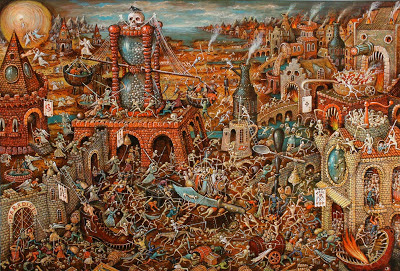Fr. Philip Neri Powell, OP
St. Dominic Church, NOLA
Many of the homilies that Catholics hear on the feast of All Souls leave the distinct impression that heaven is overpopulated; hell is vacate; and purgatory is just a silly medieval myth. Much will be made of Dante's overbearing influence on how we think about the nature of the afterlife, and everyone will be assured that God leaves no one behind. That last part—about God leaving no one behind—is true. He doesn't. What's left out, however, is the fact that we are perfectly capable of leaving ourselves behind, and that God will honor this choice. God won't leave us behind, but He will allow us to leave ourselves. Jesus says, “Everything that the Father gives me will come to me, and I will not reject anyone who comes to me. . .” No one who comes to Christ will be rejected by him. However, no one who chooses to reject him will be hog-tied and frog-marched into heaven against his/her will. Love can be commanded; it cannot be coerced. The saints chose Christ's love. The damned chose pride's conceit. The souls we pray for this evening chose Christ's love for themselves but did not love as he loved them. Now, they wait to be made pure as he is pure.
Following Christ is not a part-time job or a weekend hobby. It's not an experiment, a fling, or a stepping stone while seeking something better. When we choose to accept Christ's love, we also choose to love as he loves us—sacrificially, without conditions. He says that he will reject no one who comes to him. And if we choose to be part of his sacrifice, and benefit from his love, then we must also choose to freely grant that same benefit to others. In practical terms, this means that we do not get to pick and choose whom we will love nor do we get to sort through the crowd electing some for salvation and rejecting others. As faithful followers of Christ, we love indiscriminately so that those who are tempted to reject Christ might see in us the good spiritual fruits that result from coming to him and believing in him. If anyone—at the last day—rejects Christ and chooses instead to live separated from God forever, do not let it be said that they rejected Christ b/c we failed to love as Christ loves us. Failures in charity can be large and small. Large failures kill charity outright. But most of our failures to love as we ought are small, driven by petty passions or slight hurts. It's these little weaknesses, these venial lapses that keep us within reach of heaven but outside our grasp.
All our years are spent desiring God. When we realize that it is God whom we desire most, we come to Christ. And we spend the rest of our years being pounded into perfection by trial, temptation, victory, and the sure knowledge that we are not alone. Very few leave this life having both reached for and grasped heaven's perfection. We celebrated their victories yesterday. Most of us will likely die with a small stain or two on our baptismal garment. After death, without the limits of a body, we see more perfectly Him whom we have sought all our lives; yet, b/c we are not yet stainless, we cannot join him. The difference btw seeing Love more perfectly than we ever have before and knowing how we have failed to love as we ought is what we call the “pains of purgatory,” the pain we experience as a soul perfectly loved by God but not itself perfectly loving. In purgatory, we do not experience the duration of time but rather the intensity of our failures as we freely surrender them to God. As each failure is washed clean, our desire to join Him intensifies. Rather than wait in purgatory to love as Christ loves us, come to him now and believe his Good News, accepting as your own his mission to reject no one, to leave no one behind. In both small ways and large, love as Christ loves you.
_____________Follow HancAquam or Subscribe ----->










